Peter MALONE
Saturday, 18 September 2021 19:21
Thunder of Drums, A
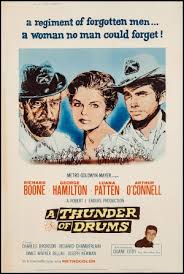
A THUNDER OF DRUMS
US, 1961, 97 minutes, Colour.
Richard Boone, George Hamilton, Arthur O'Connell, Luana Patten, Richard Chamberlain, Charles Bronson.
Directed by Joseph Newman.
A Thunder of Drums is a cavalry western, the type of story that John Ford liked to make in such movies as Fort Apache, Rio Grande. Richard Boone has a starring role as a crusty commander. George Hamilton, in an early starring role, is the ambiguous romantic hero. It is interesting to see Richard Chamberlain in his early Dr Kildaire days as a conventional western character and Charles Bronson, still years before stardom, is there in the Victor Mc Laglen-type comic role.
The film is colourful, if familiar.
1.Entertaining western? The western forts? Tension in the fort? The Indians? Battles, massacres? The American heritage?
2.Cinemascope and colour, the western locations, the life in the fort, action? Musical score?
3.The title, the relationship between cavalry and Indians after the Civil War? The focus on the Indians, the opening massacre, the group stalking the cavalry men? Apaches or Commanches? The opinions of the scouts, of the soldiers? The expeditions, the massacres, the pursuits, the tricking of the Indians, final confrontation? The film's comment on Indian-white relationships?
4.Maddox as the captain, gruff personality, with the men? His reaction to the massacres? His young officers? His dislike of McQuade?, the background of his lack of promotion, clash with McQuade's father? Sending out the expeditions? Discipline? His advice to McQuade?, riding him hard, the training? Getting advice? Porter and his expedition, Gresham? His being aware of the emotional tangles? The possibilities of drinking, pursuing the Indian women, becoming a good soldier? The dance, the aftermath? Going on the mission, Gresham's death? His strategy for trapping the Indians? His commendation of Mc Quade? Their drinking together at the end?
5.Mc Quade, his training, his father as a general? Arrival, the meeting with Tracy, their past? Being discovered by Porter - blackmailed by Hannah? His being out of place, the attack from Maddox? In training, his advice about the Indian lands? His background and growing up there? The tension with Tracy, the dance, his behaviour, Gresham's discovery? The expedition, Gresham's death? His relationship with the men, the fight with Hannah, friendship with the paymaster? The siege, leading the Indians to them, the final confrontation? Tracy's leaving, his final decision?
6.The young officers and life on the fort, Porter and his mistakes, reaction to McQuade? Gresham, his ability, his betrayal, his wanting to go to his death?
7.The paymaster, age and experience, friendships? Supervision of the troops, the money, their drinking, chasing the Indian women? His action, death?
8.Hannah, the comic type, his laughing, spying, drinking, fights, blackmailing Mc Quade, in action?
9.The women on the fort, Tracy and the marriage, coming from the East, her wanting to go back? In love with Mc Quade, the marriage to Gresham, preparing the dance, the dancing, her behaviour, her leaving? Helping with the girl from the massacre? The other women, wives, the elderly? Social life at the fort?
10.The little girl, the trauma of the massacre, her not being able to speak, Tracy helping her, taking her away?
11.The western themes of the fort, tensions in the fort, fighting the Indians? The American traditions?
Published in Movie Reviews
Published in
Movie Reviews
Tagged under
Saturday, 18 September 2021 19:21
Thunder Run
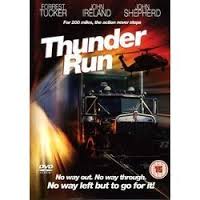
THUNDER RUN
US, 1986, 91 minutes, Colour.
Forrest Tucker, John Ireland, John Sheppard.
Directed by Gary Hudson.
Thunder Run is an action adventure. However, the screenplay looks as if it was composed by committee - something for everyone. Forrest Tucker and John Ireland, veterans of many decades of film-making, are the central characters. However, John Sheppard is the young hero with which the younger audiences can identify. There is action, action in Nevada settings, square-dance music as well as contemporary music, a touch of sex. The plot is also modern insofar as plutonium is being transferred, there are terrorists, ex-CIA members and intrigues. There is also echo of the past with drag-races and a heavy truck trying to get through the Nevada countryside.
1.Action adventure? For the average audience keen on action? Older audiences, younger audiences?
2.The Nevada settings, the town, the mine, the highways? Actions and stunts? Special effects? Musical score?
3.The title, memories of Korea, the veterans and their action, the truck?
4.The initial plot: the plutonium, the terrorists, the attack? George and his contacts with the military, ex CIA? His plan? The approval of the army? The approach to Charlie, the money, persuading him?
5.Charlie and his mine, making do, cobalt? His genial relationship with his wife? With Chris? The proposition, his acceptance, finding the time to tell Maggie, her reaction? Chris and his interest and wanting to go? The buying of the truck, the picking it out for terrorist attack? The relaxing, the square-dancing? Maggie and her concern? Support?
6.Chris, relationship with his grandparents, his work, skill with machines, cars? The drag-race, his friends, winning? His girlfriend, sex? Paul, collaboration? In the water? His girlfriend? Computer skills?
7.The set-up for the ride: Paul and the girls getting the computer code? Charlie and Chris and Chris's stowing away? The travelling, the attack by the terrorists, the arms and fire against them?
8.The sketch of the terrorists, a big group, Carlos and his angers? Their pursuit, the cars, the trucks, the helicopter? Manoeuvres?
9.Their being bettered by Charlie? The crashes, the separation of the truck and its load? The small truck and getting the plutonium through? The split-second timing for the computer code? The barrier and the tunnel? Going through?
10.The irony of George wanting the plutonium for himself? The clash with Charlie? Charlie informing the military and their arresting George? The happy ending?
11.Popular ingredients for popular entertainment? American style of the '80s?
Published in Movie Reviews
Published in
Movie Reviews
Tagged under
Saturday, 18 September 2021 19:21
Three Ninja's
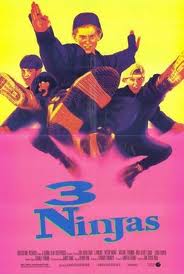
THREE NINJAS
US, 1992, 84 minutes, Colour.
Victor Wong, Michael Treanor, Max Elliot Slade, Chad Power.
Directed by John Turtletaub.
Three Ninjas is a Hollywood- Asian co-production, designed for younger boys. Three Ninjas focuses on a Japanese grandfather, his three American grandchildren, their Secret Service father and is involvement with a drug dealer who used to be a partner with the grandfather. The grandfather trains his grandsons in the martial arts, giving them new names. Their father is too busy to pay them attention. However, the drug dealer tries to abduct them (with two ineffective Bill and Ted surfies) but eventually takes them hostage. They use their wits to escape and there is a final confrontation between the grandfather and the drug dealer. The plot is familiar - but is geared for the younger audience, indicating that martial arts should be a matter of control and be used as a weapon in the fight against evil rather than as a weapon against others.
1.The popularity of the film? With younger boys? Family audiences?
2.The American settings, the grandfather's home, the city and the ship, offices? The musical score?
3.The title, audience expectations of Ninja martial arts? The focus on the boys?
4.Sam, Jeff and Michael, their age, their experience, their holiday with their grandfather, learning the art of combat, self-defence - and their new names: Rocky, Colt and Tumtum?
5.Sam, the FBI agent, the attempt to capture the arms dealer Snyder, the boat, the blowing of the cover, the failure of the attempt?
6.Sam's being too busy to care for his sons? Their relationship with him? With their mother? The boys trying to interest their father in their change and their names?
7.Snyder, arms, customers, henchmen? His assistant hiring the two surfies - inept, their patter, the comedy of their attempts to kidnap the brothers?
8.Kidnappers, taking the boys, holding them hostage? The reaction of the boys - overcoming the surfies? In the warship?
9.The message to Emily, her getting the information to Grandpa? Their going to the ship?
10.Sam and the agents, his dealing with the boys, their escape, Grandpa - and the confrontation?
11.The arrival of the FBI in time, the contribution by the boys, the agents? Saving Grandpa? And Sam finally promising to spend more time with his sons?
Published in Movie Reviews
Published in
Movie Reviews
Tagged under
Saturday, 18 September 2021 19:21
Think Fast, Mr Moto
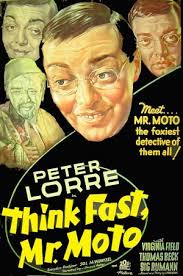
THINK FAST, MR MOTO
US, 1937, 66 minutes, Black and white.
Peter Lorre, Virginia Field, Sig Rumann, J.Caroll Naish.
Directed by Norman Foster.
Think Fast, Mr Moto was the first in a popular series in the '30s and '40s. Mr Moto, based on a character created by J.P. Marquand (H.M. Pullham Esquire), was a Japanese merchant involved investigating all kinds of mysteries. Peter Lorre is quite ingratiating in the central role. Sig Rumann is one of the blustering villains. The film is interesting in its presentation of the popular crime stories of the period (in the Charlie Chan tradition) - diamond-smuggling, drug-smuggling, phone-tapping, the relationship between the US and Asia. The series is popular material - and a memory of past decades.
1.Popular murder mystery? Thriller? Introducing the character of Mr Moto?
2.San Francisco, the high sea, Honolulu, Shanghai - and the studio settings for these exotic locations? Musical score?
3.Peter Lorre as Mr Moto - the initial disguise, fight, investigations, the diamonds, Mr Moto as himself, going on ship, contacts with the police - but the audience seeing him as possibly a criminal? Friendship with Robert, with Gloria, keeping an eye on them during the trip? Shipboard activity? Carson and his attack, his death? Contacts in Shanghai, the secretary and tapping the phone? The merchant and the shooting? Mr Wilkie - and suspicions? Tracking down Gloria, her uncle? The dinner, the gambling, the shoot-out and the confrontation? The truth? The police arriving on time? Mr Moto lives to solve another crime? Blend of the serious and the humorous?
4.Robert, his father, the drinking, the special message, friends, romance with Gloria, on board - and the friendship with Mr Moto? With Mr Wilkie, the false letter? Search for Tania, wanting to investigate the smuggling, captured, rescued?
5.Gloria, on board, attractive, keeping an eye on Robert? Vanishing, singing in the nightclub, the revelation of the truth? The White Russians and their migration, becoming involved in smuggling?
6.Her uncle, his contacts, with Wilkie, the shoot-out, the gambling, the diamonds? His death?
7.Wilkie, the overseas head of the firm, suave, the shooting, the truth?
8.The atmosphere of this kind of murder mystery of the period - American tone, exotic settings?
Published in Movie Reviews
Published in
Movie Reviews
Tagged under
Saturday, 18 September 2021 19:21
Thin Line Between Love and Hate, The
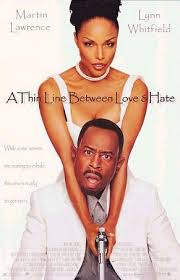
THE THIN LINE BETWEEN LOVE AND HATE
US, 1996, 106 minutes, Colour.
Martin Lawrence, Lynn Whitfield, Regina King, Della Reese, Roger G.Mosley.
Directed by Martin Lawrence.
The Thin Line Between Love and Hate was very popular in the United States, especially amongst black African audiences. The film does not transplant so well beyond the US.
The film starts as a kind of variation on Eddie Murphy comedies, the arrogant black male boasting of his seductions - and then complications arising, his betrayal of his true love, infatuation with the woman who ultimately intends to destroy him. There follows a change of heart - with a moralisingly happy ending, especially geared towards black men and their exploitation of women. While audiences are thinking that it is a variation on Fatal Attraction, the hero suddenly announces that he is in this kind of story.
The film is the work of Martin Lawrence who acts the central role, co-wrote the screenplay as well as directed. He was partnered with Will Smith in the very successful police action thriller, Bad Boys. Lyn Whitfield is very glamorous in the thankless role of the woman with the death wish and the fatal attraction.
The film is set in an affluent California, the world of nightclubs, the world of women with Harvard degrees - as well as with the brothers and their egging each other on in their sexual exploits. The film indicates the kind of glossy, soundly budgeted films that were designed for black American audiences.
1.The appeal of this kind of story: the journey of a self centred and seductive man and his fall, comeuppance and reformation? The credibility of this journey? The film as moralising - especially taking the part of black women and making a strong stance against their exploitation by men?
2.The Californian settings, the homes, the neighbourhood, the nightclubs? The contrast with the world of affluence? The musical score and songs?
3.The significance of the title and its being spoken by the hero's mother?
4.The central character and his screen presence and style, the voice-over and his seductive exploitation, seeing him at work? The response of the women? His work with his friend T, at the nightclub with Smithy? Smithy as a reformed pimp with a loving wife? The pushing of the nightclub? The encounter with the femme fatale - T and his chatter, the hero's apology, her spurning him, coming to the club, leading him on, the attraction, his going to her home, the affair, sharing so much together, her transforming him with his clothes? Her jealousy when he didn't come to her party? Beginning to wreak revenge - injuring herself, the police, injuring Mia? Her growing more desperate? His having to cope with all of this - his offhand reaction, his realisation that she was serious? At the nightclub? His rediscovery of his love for Mia, the talk with Smithy, trying to protect Mia from the femme fatale's vengeance? The final confrontation and his injuries? Learning his lesson?
5.The hero and his relationship with his mother, her moralising with him? His sister, the prom, his antagonism towards her partner?
6.The nightclub owner, the plans, trusting the hero and T? The opening of the club, its success, its burning down?
7.T and his style, friendship with the hero? His advice? The contrast in the two characters?
8.The playing out of the fatal attraction? The hero and his being insensitive, oblivious? Under attack, the violence, the arrest, her treatment of him and the shooting? The final confrontation and his hospitalisation?
9.The contrast with Mia, the air force, her friend, the treatment by the hero? Her putting up with it? Her decision to resist him? His apology, gentle treatment, change of heart? The danger and her not realising it? Her participation in the final confrontation?
10.The gallery of characters - the various types present in black entertainments? The role of men, the role of women? The drawing on Fatal Attraction - with the downfall of the woman and the explanation of her exploitation by her husband and her violence? The vindication of the male after learning his lesson?
Published in Movie Reviews
Published in
Movie Reviews
Tagged under
Saturday, 18 September 2021 19:21
The 14
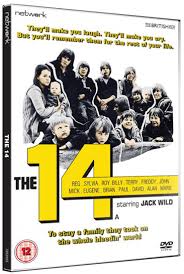
THE 14
UK, 1972, 105 minutes, Colour.
Alun Armstrong, June Brown, Keith Buckley, Matthew Guinness, Jack Wild.
Directed by David Hemmings.
The 14 is based on a true story of a London family, a sick and dying mother with 14 youngsters under 18.
The film is directed by actor David Hemmings. He re-creates the atmosphere of the suburbs of London, the difficulties of managing such a large family - the wildness of the children, yet their strong bonds amongst themselves.
The film also shows the difficulties for welfare agencies in trying to care for the family, with the inevitable moves to move them apart. There are some disastrous scenes with a woman who comes to cook for them and their reaction against her, being transferred to an orphanage and their wreaking havoc for the nuns.
Jack Wild (the Artful Dodger in Oliver) is very good as the young, responsible Reggie. The rest of the children are played quite persuasively and June Brown is excellent as the mother.
The film goes on for some time, repeating scenes of family interactions with which we have become familiar and there are some sentimental touches. However, The 14 brings to mind the strong difficulties for people in poverty in such large families in cities.
1.The impact of the film? True story? Glimpse of family, difficulties, love and bonds?
2.The London settings, the suburbs, the house? The contrast with the institutions, the farm? Musical score, songs?
3.The title and the focus on the number of children, their interactions, relationship with their mother?
4.The establishing of the situation: the focus on the mother, a good woman, trying to support all her children, her attitude towards each of them, the meal, knowing them by name? The young man in the house - and his not taking responsibility? The mother and her weariness, illness, the collapse, hospital, the impact of the visit of the children, the news of her death? Funeral?
5.The situation for the children - trying to survive, Reggie in charge? Sylvia? Work at home, the shopping, going to school or not? The house itself and its being condemned? The initial scenes of managing?
6.The inspections by the welfare agencies, discussions with Reggie and Sylvia? Observation of the situations, the children and the cars? Raucous behaviour? The scenes with the welfare people, their discussions, concern about the children? The woman who came to cook, taking over, the mother's room - discipline, the meal, the children revolting against her?
7.The transfer to the institution, the resistance, their finally going? The nuns trying to handle the situation? The priest? The raucous behaviour in the dormitory, showers, meals? Their wanting to be together? The outing, their running away at Christmas time?
8.Reggie and his girlfriend, his age, experience, getting a job? Looking after the others? With the girlfriend and the children in the house? Discussions with the welfare officer about the situation?
9.The children, hiding at home, out on the street, stealing from the supermarket, surviving? The importance of reuniting at Christmas, the sentiment, the candles, the food, the gifts?
10.The children on the run, surviving, the police chasing them and recognising them?
11.The proposition of their going to the farm, the possibility of being together, the vote, their going to the farm - their future?
12.The film seen from the perspective of the children, their experience and lack of experience, emotions? Their perception of the adults, their mother, the young man in the house, the relief cook, the welfare people, the priest and the nuns, the farmer?
13.A film of its period? Portrait of family relationships and bonds? Social problems?
Published in Movie Reviews
Published in
Movie Reviews
Tagged under
Saturday, 18 September 2021 19:21
Thank You, Mr Moto
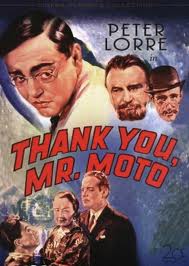
THANK YOU, MR MOTO
US, 1937, 67 minutes, Black and white.
Peter Lorre, Pauline Frederick, Sidney Blackmer, John Carradine, Sig Rumann.
Directed by Norman Foster.
Thank You, Mr Moto is considered the best of the series of detective yarns based on novels by J.P. Marquand. This one was co-written by its director, Norman Foster.
Peter Lorre again appears as the Japanese trader who is also an investigator. There is a good supporting cast for a B production from 20th Century Fox in the late '30s and includes John Carradine, Sig Rumann and silent star Pauline Frederick.
The film is an entertaining and brief crime story, action thriller - with studio-bound exotic Chinese settings. Part of a popular series of its time.
1.Entertaining thriller? The series on Mr Moto? Peter Lorre's popularity? A film of the '30s?
2.B-budget, 20th Century Fox production values, black and white photography, Chinese settings? Musical score?
3.Mr Moto, appearing enigmatically, audience suspicions, his behaviour as a detective, as a trade dealer, at the scene of the crime, dangers, solving the crime? Genial personality, Oriental style?
4.The focus on the Gobi Desert, the deaths in the desert, the caravan? The tracings and the artwork? Prince Chung and his possessions, the various dealers wanting them? The murders for their sake? The buried treasure of Genghis Khan. Prince Chung and his being attacked, the assault on his mother, her death?
5.The villains - international dealers, their contacts in the police, cruelty and torture? John Carradine as the dealer who is murdered?
6.The American official, the hero of the film, dashing etc? Eleanor and her singing, presence in China, her knowledge about the tracings? At the scene of the crime, suspicions of Mr Moto, being kidnapped?
7.The array of villains - servants, attacks, shootings, chases, the final confrontation and Mr Moto outwitting everyone?
8.Prince Chung, his tradition, dignity? His mother and her severity, his willingness to give the information to save his mother, her death, his killing himself?
9.The popularity of this kind of series in the '30s (equivalent of later television series)?
Published in Movie Reviews
Published in
Movie Reviews
Tagged under
Saturday, 18 September 2021 19:21
Testament of Dr Cordelier, The
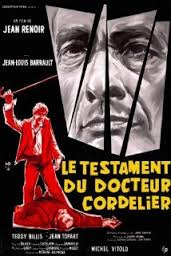
THE TESTAMENT OF DR CORDELIER
France, 1959, 95 minutes, Black and white.
Jean- Louis Barrault.
Directed by Jean Renoir.
The Testament of Dr Cordelier is a film by celebrated French director, Jean Renoir. Best known for his films of the '30s, the classics The Rules of the Game and The Grand Illusion, he spent some time in Hollywood during World War II making such films as Swamp Water, This Land is Mine, The Southerner.
On his return to France after the war, he continued to make films. However, the classics of the '30s remain his masterpieces. This film is a variation on the Dr Jekyll and Mr Hyde theme, updating it to the '50s.
1.The work of Jean Renoir? Adaptation of Robert Louis Stevenson? Adaptation to France in the '50s?
2.The Parisian settings, the city and the streets, the home of Dr Cordelier? The laboratory? Musical score?
3.The title, the focus on the will, Dr Cordelier and his relationship with M'sieur Opale? The lawyer and his drawing up the will for Dr Cordelier?
4.The perspective of the investigation of the assaults? The discovery of Dr Cordelier's behaviour rather than seeing it through his eyes and sharing his experiences of transformation? The tape and the lawyer hearing the reality of Dr Cordelier's experiments?
5.The opening brutality, the assaults, M'sieur Opale? The reaction of the people around? The police, their investigations?
6.Dr Cordelier and his reputation? Appearances? Gentlemanly - but audience suspicions? His leaving his money to M'sieur Opale? The lawyer and the discussions? The investigations? The truth? The lawyer confronting Cordelier? The tape and his confession? Self-destruction? Opale and his perverted perspective on life? Death?
7.The staff of the house, Desiree, Georges? Service, protection of the doctor?
8.The lawyer, ordinary citizen, protecting his client, knowing the secret, the investigations, entering the house, listening to the tape, the discovery of the truth?
9.The continual popularity of the Jekyll and Hyde story? Psychological aspects of ego and shadow? 19th century origins? Adapted for the 20th century?
Published in Movie Reviews
Published in
Movie Reviews
Tagged under
Saturday, 18 September 2021 19:21
Terry Fox Story, The
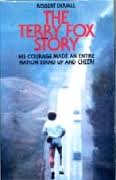
THE TERRY FOX STORY
Canada, 1983, 97 minutes, Colour.
Eric Fryer, Robert Duvall, Chris Makepeace, Rosalind Chao.
Directed by Ralph L.Thomas.
The Terry Fox Story is a Canadian film directed by R.L. Thomas (Ticket to Heaven). It is based on a true story, Terry Fox, a young man who develops cancer in the leg and who has his leg amputated. A sportsman, he decides to run across America to raise money for the Cancer Society. He runs a great deal of the way before cancer reappears in his lungs and he dies. Eric Fry is quite good as Terry Fox - not just a picture of niceness, an abrasive young man, concerned about himself as well as charity, using others and growing in awareness of selflessness as he makes his run. Robert Duvall appears as a contact person with the Cancer Society. There are guest appearances by Canadian stars including Saul Rubinek as the doctor, Chris Makepeace as Terry Fox's brother.
The film is one of those heart-warming and inspiring movies - not just mere sentiment, some abrasive scenes as well, which makes it more realistic. However, there is also a repetitiveness as we see Terry running/stumbling his way across Canada.
1.An inspiring and true story? Terry Fox in himself? Cancer? His witness to the struggle against cancer?
2.Canadian production: settings, locations across the country? The beauty of Canada? The people? Musical score?
3.The title and the focus on Terry, his suffering, his goals, achievement?
4.The portrait of Terry Fox: the credits and his playing basketball, friendship with Doug, his relationship with his family? The incident and his leg, the news of the amputation? The treatment, his loss of hair? The artificial limb? Becoming normal again - and wanting to move out from the institution? Friendship with Rika, going out with her, then leaving her (but later phoning her)? His decision to run, practise? The antagonism of his mother, support of his father? His friendship with dog, the planning, inviting him? Going to the east and the plan to run home to the west? His being sponsored by the Cancer Society? The beginnings of the run, its effect on him? The argument with Doug, his selfishness, using him as a servant? The tribute to him in the speech? The wear and tear, the bleeding, his cough? Bill and Darryl and their arrival, their support? Bill's concern, the program? The people meeting Terry on the side of the road, the official receptions? His inspiring people - the woman who talked about her son, the small boy with his loss of hair, teaching him how to swim? Growing illness, going to hospital? The new cancer? His death? His short life, growth in self-awareness, appreciation of others, the fight against cancer, inspiration?
5.Doug, his friendship, his being used? Servant, reacting, the clash? The speech and the reconciliation? Darryl and his support?
6.Bill, the organisation, pushing Terry? Meeting people? Listening to the talks, being inspired? His concern in the final illness? His final comments?
7.The sketch of the parents, the shock of the amputation? The fight amongst them all, Terry's run, the mother's hostility? Later support?
8.Rika, her friendship, work for the handicapped? Going out with Terry, his selfish attitudes towards her, reliance on her, telling her of the news of the cancer?
9.The people in the hospital, their support? Doctors?
10.The people and their support, across Canada?
11.An inspiring story? The value of the sign and the symbol, the witness? Courage?
Published in Movie Reviews
Published in
Movie Reviews
Tagged under
Saturday, 18 September 2021 19:21
Terror in the Family
TERROR IN THE FAMILY
US, 90 minutes, 1996, Colour.
Joanna Kerns, Hilary Franks, Anne Lauria.
Directed by Gregory Goodell.
Terror in the Family is an American telemovie that focuses on dysfunctional families - on the surface seeming to cope, but with deep underlying problems. The father has tended to be passive, allowing the mother to oversee the house. However, she has doted on her daughter and has spoilt her. At 15, the daughter is rebellious, seeing a fellow student with whom she is having a sexual relationship, has outbursts of violence, especially striking her mother. The young boy of the family, staying at home to hear the quarrels and covering up for his sister, has begun to drink.
The film focuses on the anxieties of the parents, especially as the mother becomes alcoholic. The film is sympathetic to the parents, critical of the children - but ultimately making a plea for understanding the children and acknowledging the faults of the parents. The film ends optimistically with the family going to counselling.
1.The impact of this kind of American telemovie, tailored for the television audience? American families and their problems? Dramatising problems, suggesting solutions?
2.The small American town, the American household, the town? Neighbours, the school? The abandoned rollercoaster? The musical score?
3.The title of the film? Seemingly sensational for its topic? The irony of the teenage girl causing the terror?
4.The structure of the film: the family clash and the injuries, the police? Three months earlier? The credible dramatising of the crises that led up to the clash? The aftermath with the court, probation, the daughter staying with her aunt? The parole? The final judgment, going to counselling?
5.The portrait of the teenage girl? Her untidy room, her music, going out, ignoring her parents? Her relationship with the boy? Sexual relationship? Her getting her brother to write notes and cover for her? Her reactions and physically striking her mother? Her lies? Playing with the band? Being found out, the lies, the cover-up? The continued violence? The apologies, watching television with her mother? The clash with her father and breaking his fingers? The brother calling the police? Her being arrested, charged? In jail and the treatment? Her ringing her boyfriend? The court hearing, the probation? Her staying with her aunt? Growing improvement? The plan to run away with her boyfriend? Her mother's visit and her desperation? The final confrontation, the court? The possibilities of therapy? A credible portrayal of a teenage girl, her behaviour, the causes within the family, within herself?
6.Cynthia and her household, orderly, controlling it? Yet spoiling her daughter? The alienation from her husband - and his going into the cellar to make bowls? The irony of their not wanting the children and the possibility of an abortion? The daughter feeling this? The mother unable to deal with her daughter, tidying her room, being ordered out, hit? Her drinking? Her criticism of her husband? Looking after her mother - and her mother's harshness? The clash with her sister and her rebellion? Forcing the young son to play for the visitors? Her losing control, accepting her daughter's lies, finding out the truth, going to the school but lying for her? The punishment and the grounding - yet wanting to concede? The final blow-up, her anger, her upset about the arrest? The phone calls, her visit with the pizza, her drinking? The relief in court? The confrontation with her sister and the truth told about her relationship with her, with her mother? Coming to terms with her husband? The discovery of her son's vodka bottle? Her refusal to go to therapy - but her final coming? Hope for the future?
7.Todd, the gentle father, leaving things to his wife? His pride in his work, making his dishes? Seeing the truth about his daughter, his relationship with her? Her threatening him with charges of rape? His bewilderment? Wanting to take a stand with his wife, ultimately taking the drink from her? His injuries, in the hospital, in the court? The decision to go to therapy?
8.Adam, his age, covering for his sister, hearing the quarrels, his intelligence and assessment of the situation? The piano, self-conscious? Drinking the vodka? His anxiety and phoning the police? Going to therapy?
9.Cynthia's mother, her harshness, her drinking? Harsh tactics for dealing with children? Anger at her younger daughter?
10.The younger daughter, rebelling, going away from home? Visiting, being supportive of her niece? Taking her during the probation period? Her wise dealing with her niece?
11.The boyfriend, the harsh background at home with his mother and her boyfriends? Suspended? The band? Depending on his girlfriend? Together, in the house? The plan to run away? Going up to the roller-coaster? Talking of suicide? In court, his wanting to go away, his being caught by his girlfriend, his explanations? His final disillusionment when she took a stand?
12.Therapists, their wisdom and analysis of the situation? The judge in the court?
13.Typical of behaviour in American families? A useful psycho-drama for reflection and discussion?
US, 90 minutes, 1996, Colour.
Joanna Kerns, Hilary Franks, Anne Lauria.
Directed by Gregory Goodell.
Terror in the Family is an American telemovie that focuses on dysfunctional families - on the surface seeming to cope, but with deep underlying problems. The father has tended to be passive, allowing the mother to oversee the house. However, she has doted on her daughter and has spoilt her. At 15, the daughter is rebellious, seeing a fellow student with whom she is having a sexual relationship, has outbursts of violence, especially striking her mother. The young boy of the family, staying at home to hear the quarrels and covering up for his sister, has begun to drink.
The film focuses on the anxieties of the parents, especially as the mother becomes alcoholic. The film is sympathetic to the parents, critical of the children - but ultimately making a plea for understanding the children and acknowledging the faults of the parents. The film ends optimistically with the family going to counselling.
1.The impact of this kind of American telemovie, tailored for the television audience? American families and their problems? Dramatising problems, suggesting solutions?
2.The small American town, the American household, the town? Neighbours, the school? The abandoned rollercoaster? The musical score?
3.The title of the film? Seemingly sensational for its topic? The irony of the teenage girl causing the terror?
4.The structure of the film: the family clash and the injuries, the police? Three months earlier? The credible dramatising of the crises that led up to the clash? The aftermath with the court, probation, the daughter staying with her aunt? The parole? The final judgment, going to counselling?
5.The portrait of the teenage girl? Her untidy room, her music, going out, ignoring her parents? Her relationship with the boy? Sexual relationship? Her getting her brother to write notes and cover for her? Her reactions and physically striking her mother? Her lies? Playing with the band? Being found out, the lies, the cover-up? The continued violence? The apologies, watching television with her mother? The clash with her father and breaking his fingers? The brother calling the police? Her being arrested, charged? In jail and the treatment? Her ringing her boyfriend? The court hearing, the probation? Her staying with her aunt? Growing improvement? The plan to run away with her boyfriend? Her mother's visit and her desperation? The final confrontation, the court? The possibilities of therapy? A credible portrayal of a teenage girl, her behaviour, the causes within the family, within herself?
6.Cynthia and her household, orderly, controlling it? Yet spoiling her daughter? The alienation from her husband - and his going into the cellar to make bowls? The irony of their not wanting the children and the possibility of an abortion? The daughter feeling this? The mother unable to deal with her daughter, tidying her room, being ordered out, hit? Her drinking? Her criticism of her husband? Looking after her mother - and her mother's harshness? The clash with her sister and her rebellion? Forcing the young son to play for the visitors? Her losing control, accepting her daughter's lies, finding out the truth, going to the school but lying for her? The punishment and the grounding - yet wanting to concede? The final blow-up, her anger, her upset about the arrest? The phone calls, her visit with the pizza, her drinking? The relief in court? The confrontation with her sister and the truth told about her relationship with her, with her mother? Coming to terms with her husband? The discovery of her son's vodka bottle? Her refusal to go to therapy - but her final coming? Hope for the future?
7.Todd, the gentle father, leaving things to his wife? His pride in his work, making his dishes? Seeing the truth about his daughter, his relationship with her? Her threatening him with charges of rape? His bewilderment? Wanting to take a stand with his wife, ultimately taking the drink from her? His injuries, in the hospital, in the court? The decision to go to therapy?
8.Adam, his age, covering for his sister, hearing the quarrels, his intelligence and assessment of the situation? The piano, self-conscious? Drinking the vodka? His anxiety and phoning the police? Going to therapy?
9.Cynthia's mother, her harshness, her drinking? Harsh tactics for dealing with children? Anger at her younger daughter?
10.The younger daughter, rebelling, going away from home? Visiting, being supportive of her niece? Taking her during the probation period? Her wise dealing with her niece?
11.The boyfriend, the harsh background at home with his mother and her boyfriends? Suspended? The band? Depending on his girlfriend? Together, in the house? The plan to run away? Going up to the roller-coaster? Talking of suicide? In court, his wanting to go away, his being caught by his girlfriend, his explanations? His final disillusionment when she took a stand?
12.Therapists, their wisdom and analysis of the situation? The judge in the court?
13.Typical of behaviour in American families? A useful psycho-drama for reflection and discussion?
Published in Movie Reviews
Published in
Movie Reviews
Tagged under